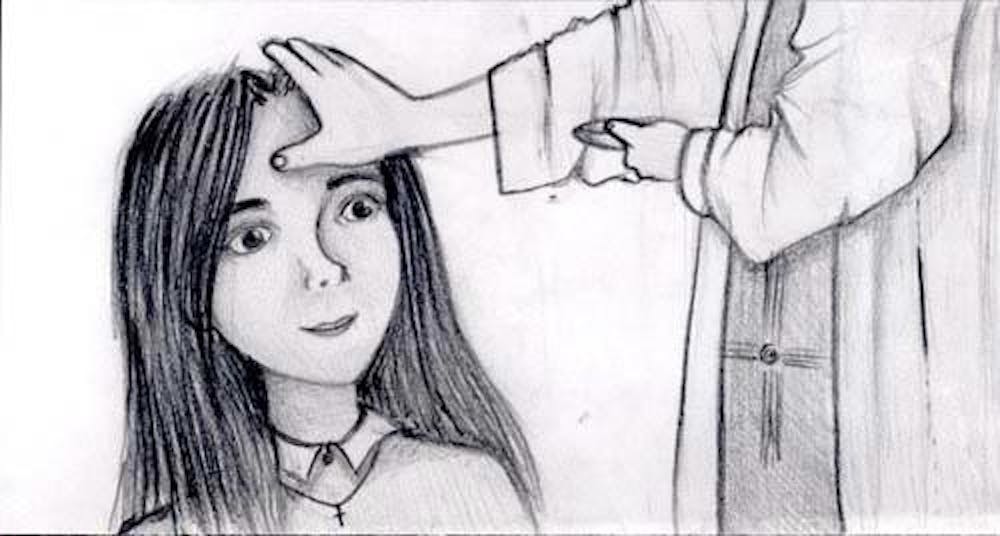Patrick Hannon (The Beacon)
By Patrick Hannon, Guest Commentary
I love Ash Wednesday. It's the one day, it seems to me, that we Catholics get to publicly declare, in a way a crucifix around the neck cannot, who we are. For one day, there's no hiding our true identity.
You walk downtown on Ash Wednesday and you know exactly who the Catholics (aka usual suspects) are. You nod at them as they pass and they nod back at you. This thrills me.
We exchange smiles perhaps, because we have this hunch that our non-ash wearing Christian brethren and sisteren and folks whose hearts are drawn to other faiths, sort of think it's cool and maybe a little strange what we've done to ourselves.
It's like when I was a boy watching baseball on TV one summer afternoon. I saw Roberto Clemente come to bat and I didn't have a clue who he was because he was a Pirate and I was an Oakland A's fanatic, and our tribes didn't mix particularly well.
Just before he took a couple practice swings, he crossed himself, and my eyes lit up. I had never seen a player do that before.
I was a diehard Roberto Clemente fan after that. And I cried when he died in that plane crash. We were, after all, family.
You're looking up at the menu board with a big huge smudge of ash on the forehead and the girl across the counter at McDonald's is already pushing the fish filet sandwich button on the register.
There's something oddly comforting about that when you think about it.
There are only two other times we have our foreheads marked with the sign of the cross, and it's revelatory.
When our parents brought us to the door of the church on the day of our baptism, the priest met us there; and after essentially saying howdy do, he traced the cross with his thumb on our tiny foreheads, claiming us for Christ forever in the name of the Church. And then he invited our parents and godparents to do the same.
That's a lot of crosses. If you look carefully, you might still see a trace of that first cross still there.
The only other time, other than Ash Wednesday, when the Church marks our foreheads is when we are sick or dying.
The priest dips his thumb in the oil of the sick and anoints our forehead (and our palms) with the sign of the cross as he beseeches God to help us with his healing and soothing love. "May the Lord who frees you from sin," the priest says, "save you, and raise you up."
I've seen shoulder-bending, back-breaking burdens lifted by that oily cross hundreds of times.
In our Holy Cross Constitutions, the rule that guides us Holy Cross men, we are told in one place, "The face of every human being who suffers is for us the face of Jesus Christ who mounted the cross to take the sting out of death. Ours must be the same cross and the same hope."
Perhaps this haunting and holy Wednesday cross of ash does more than call us out as Catholics. Maybe it marks us in a deeper way. Perhaps it reveals our broken frail cracked wounded muddy humanity, and says "You know what, this might be what is best about us all."
Not that we are coiffed and perfumed or nattily-dressed and cologned; not that we are muscled and toned and graceful; not that we are smart and witty and good with words or a chisel or a scalpel; not that we can solve an equation or a riddle or resolve an argument, or build a company or even finally figure out how to tap into nuclear fusion, which I'll admit would be awesome and the world would be forever grateful.
No, what the smudge of forehead ash-cross says on one day in the whole year is that what makes us most human, the best thing about us, what unites us all, is this amazing ability we have to actually care about a stranger, even when they are not of our small tribe, even if we have every reason to fear him or despise her or dismiss him or shun her.
For us, in the face of suffering, the lines dissolve and the walls come tumbling down. In that holy intersection of divinity and humanity, of sin and grace, on that cross of desolation, the suffering Other is us.
Believing that maybe the coolest thing of all.
Fr. Patrick Hannon is a theology professor. He can be contacted at hannon@up.edu.
(Ann Truong | The Beacon)








